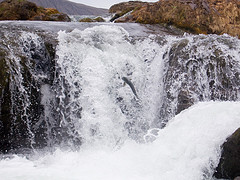North Atlantic Salmon Fund - Fair Compensation for Conservation
By: Amos S. Eno
Posted on:01/26/2011Orri Vigfusson, the world’s number one salmon conservationist, explains his idea of a “fair deal,” paying netsmen and long-liners for their fishing rights
Business negotiations are one of Orri Vigfusson’s strong suits. The owner of Icy Vodka in Iceland, he has been able to negotiate his way into that most exacting of world markets for vodka: mother Russia.
True to his business roots, Orri says, “I believe in fair deals. The netsmen of the north Atlantic have a historic and cultural right to harvest salmon. If salmon are in precipitous decline because of overfishing, we cannot take away the netsmen’s fishing rights. We have to negotiate and pay a fair price.”
The All-too-familiar History of Atlantic Salmon
“I come from a herring family. We’re from a small place in the north of Iceland near the Arctic Circle. By the 1960s, the herring had been overfished, so we had to stop for more than 30 years. At that point I became a sport fisherman. It was my wife who introduced me to salmon fishing.
“In the 1980s, when we began catching fewer and fewer salmon all over the northern Atlantic, I knew I didn’t want the same thing to happen all over again. That’s when I got the idea to start the North Atlantic Salmon Fund.”
Since its founding, NASF has pioneered commercial conservation agreements that help commercial salmon fishermen switch to other more sustainable forms of  fishing.
fishing.
“I got in touch with some fellow fishermen and some leading salmon authorities, then took a plane to the Faroe islands (between Iceland and Norway) to negotiate with the long-liners there. My message was ‘look, none of us wants the fish to die away. But you make your living from the salmon, so I’ll buy out your fishing quota and you can use that time to fish for something else.’ It took two years to reach a deal, but that deal is still good today.”
The problems afflicting wild salmon in the north Atlantic are many:
- habitat loss or degradation in the spawning rivers of Spain, Portugal, France, Great Britain, Scandinavia, Iceland, and northeastern North America;
- sea lice and disease spread by farmed salmon escapees, particularly the unregulated Norwegian salmon farms;
- genetic “pollution” from farmed salmon that escape and spawn with wild salmon;
- and overfishing, particularly the continuing practice of "interceptory" fishing by Norway and Scotland.
Interceptory fishing is a particularly egregious practice that even this year is the subject of international disagreement among Norway, Russia and Finland.
Norway has received repeated warnings from neighboring governments, scientists, and conservationists about this practice. Nevertheless, the Norwegians continue to net salmon in narrow fjords as they are returning to spawn in rivers of not only their own country but also Finland and Russia, risking further international provocation. Needless to say, interceptory netting is the ecological equivalent of shooting female deer in early spring, just before they drop their fawns.
How Netsmen and Land Stewards are AlikeOkay, Orri may be knighted in two different countries and may have done more than any other individual worldwide to stop the extinction of north Atlantic salmon, but why am I blogging about him? What does Atlantic salmon have to do with stewardship and private landowners?
To find out, return to the blog next week, when Orri shares his insights on how to create successful conservation partnerships!
 Sign In
Sign In
 Sign In
Sign In
